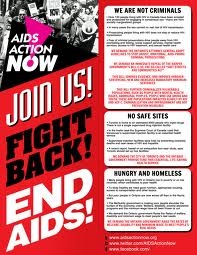In Canada, people living with HIV can be charged with a criminal offense if they do not disclose their HIV to sexual partners before they have sex that poses a significant risk of HIV transmission.
During the beginning of 1989 to June of 2012, at least 140 people have been criminally charged for allegedly failing to disclose their HIV+ status to a sexual partner.
Almost half of the criminal cases in Canada have occurred in Ontario.
Most cases involve men facing charges for allegedly not disclosing their HIV+ status to female sexual partners.
Over half the cases have resulted in convictions.
Almost 90% of the people convicted have gone to jail.
People have faced lengthy jail terms even when no HIV transmission occurred.
Why is Criminalizing HIV non-disclosure a problem?
Criminalizing HIV non-disclosures takes a “law and order” approach to an exceeding complex health and social issue–the prevention of HIV. While using the criminal law may be warranted in some extreme situations, like wilful HIV transmisison, what we are seeing in Canada is a much more expansive use of the criminal law.
The “law and order” approach does virtually nothing to stop HIV transmission, stigmatizes people living with and at risk of HIV, and is undermining proven HIV prevention strategies and programs.
A big part of the problem in Canada is the question of what constitutes a “significant risk” of HIV transmission. Canadian courts have not defined that phrase.
So people living with HIV don’t know what the law expects of them. And police, Crown prosecutors and courts have often relied upon this lack of clarity to place and unreasonably strict legal obligation on people living with HIV.
As a result, people have been charged and convicted when the risk of HIV transmission has been minimal to non-existent. This has included situations where people used condoms for intercourse or only had oral sex.
The expansive use of the criminal law makes it harder to provide health care and support services to people living with HIV and people at risk of HIV infection.
If governments’ goal is to prevent HIV transmission, it makes more sense to rely on proven public health approaches instead of the blunt force of the criminal law.
The Campaign
The Ontario Working Group on Criminal Law and HIV and Exposure mounted a campaign to pressure Ontario’s Ministry of the Attorney General to establish a consultation process for developing prosecutorial guidelines for criminal charges related to HIV non-disclosure.
Prosecutorial guidelines can help to ensure that people are not charged when they do not pose a significant risk of HIV transmission.
They can help ensure that criminal complaints related to HIV non-disclosure are handled fairly and without discrimination.
They can help ensure that criminal cases are informed by-up-to date scientific research on HIV transmission risks.
In December 2010, the Attorney General publicly committed to developing prosecutorial guidelines for HIV prosecutions. Yet the Ministry of the Attorney General has yet to publish guidelines.
For background information about HIV criminalization in Ontario, the Guidelines Campaign, to sign onto the Campaign, to read the Working Groups recommendations about what the guidelines should cover, and for more information on the Working Group, see their website.
For more information on the criminalization of HIV in Canada and internationally, visit Canada’s leading HIV and human rights organization, the Canadian HIV/AIDS Legal Network , where you can access fact sheets, videos, briefing papers, reports, and media releases.
Source. AIDSACTIONNOW.com






